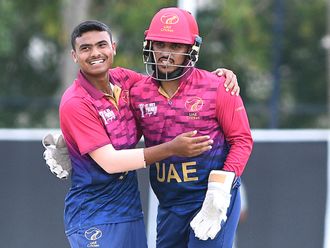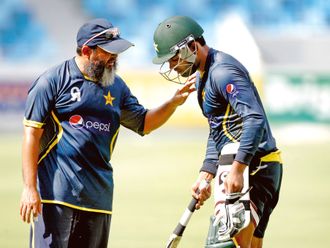London: New coach Trevor Bayliss has told England they must “fight fire with fire” if they are to regain the Ashes from his native Australia.
Former New South Wales batsman Bayliss, the first Australian to coach England, has been installed just ahead of the Ashes, which begin next week with the first Test in Cardiff.
England named their squad for that match on Wednesday, with the XI who finished the drawn two-Test series with New Zealand plus Yorkshire leg-spinner Adil Rashid and Middlesex fast bowler Steven Finn all selected.
“To be successful against Australia it’s certainly not going to be by taking a backward step or allowing the Australians just to dictate terms,” said Bayliss.
“You’ve got to get out and fight fire with fire, be positive and aggressive and individuals have to play their own natural game,” the former Sri Lanka and New South Wales coach added.
“They have been selected to play their way and that is what’s going to be successful for them.”
England won plaudits for the way in which they transformed their white-ball play by beating World Cup finalists New Zealand 3-2 with a series of dynamic displays in a recent one-day international series under the guidance of Paul Farbrace, now Bayliss’s deputy.
Whether England can maintain a similarly aggressive approach under Test captain Alastair Cook, who didn’t feature in the one-dayers and has been accused of being excessively cautious, is one of the intriguing subplots of this season’s Ashes.
But as far as the 52-year-old Bayliss is concerned, England have little choice.
‘Haven’t kept up’
“The way the game has been played over the last five or 10 years you could argue that maybe we haven’t kept up to date as some of the other teams,” he said.
“Whether you like it or not the T20 format and the one-day format do have a bearing on the way the game is played at Test level. It’s that philosophy of being positive and aggressive.
“Being positive and aggressive is not necessarily trying to hit fours and sixes. It’s being that mental aggressiveness, thinking about rotating the strike — where are my singles? What bad balls can I hit for four? How are they trying to get me out?
“You do that, the bad ball comes along, and you hit it for four or six.”
Meanwhile, Bayliss said his view of coaches wasn’t too different from that of Australia greats Ian Chappell and Shane Warne, who’ve both suggested that the only thing a coach [bus] is good for is transporting a team to the ground.
Bayliss, who has guided New South Wales to first-class domestic Sheffield Shield titles and Sri Lanka to a World Cup final, as well as enjoying Twenty20 success with both the Sydney Sixers and the Kolkata Knight Riders, said being a good coach meant empowering players to make their own decisions.
“It’s not all that far removed from some of Warnie’s thoughts,” said Bayliss. “If you look in history at the best players in the world, they’ve all been self-reliant.
“Not only are they single-minded and they know what to do off the field and how to prepare, they are able to make decisions for themselves out on the ground, rather than look to the coaching staff for an answer.
“One of my philosophies is that the best coaches are the other 11 players in the team.”
As for any question of divided loyalties, Bayliss brushed that aside by saying: “In Australia when I grew up there was a lot of backyard cricket playing against your mates and your brother.
“I don’t see this as any different as long as there is that professional respect.”











